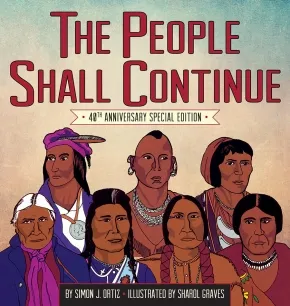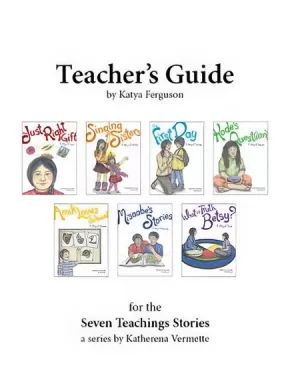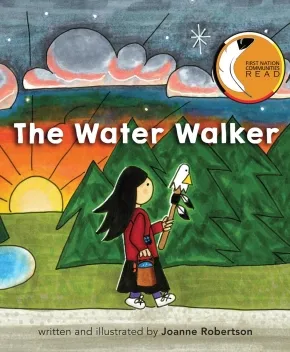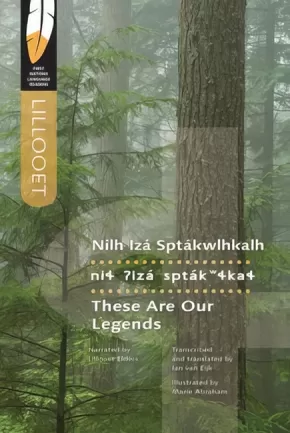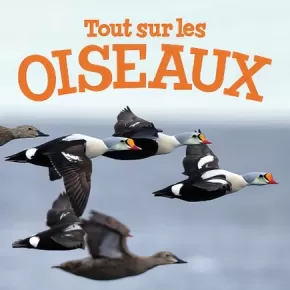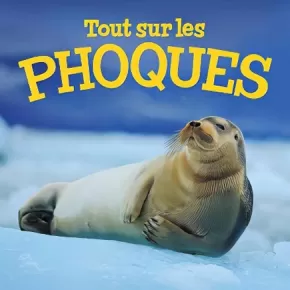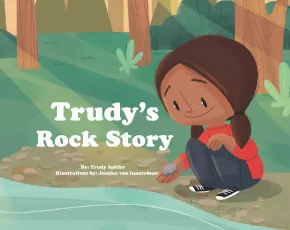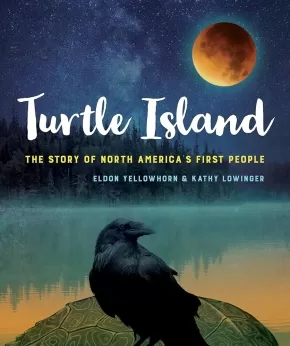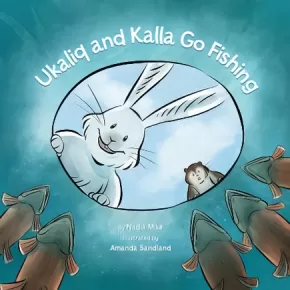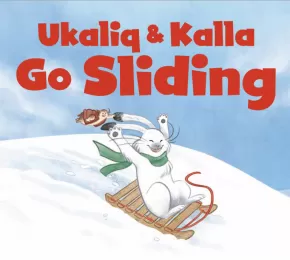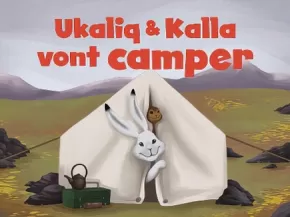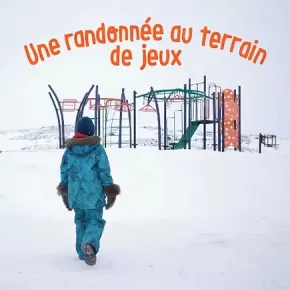
Browse Books for Kids
1846
-
1860
of
2601 Results;
Sort By
Go To
of 174
The People of the Sea
$21.95
Format:
Paperback
Text Content Territories:
Indigenous Canadian; Inuit;
ISBN / Barcode: 9781772271386
Synopsis:
Synopsis:
When young Donald and his friends head down to the water to play, they have no idea that they are soon to encounter an arnajuinnaq ('mermaid'), one of the creatures that his elders have told him about. Terrified, the boys run back to their camp, ready to tell everyone what they have just seen. But what did they see? They can't seem to remember it clearly. It is up to Donald's grandmother to explain to them the magical creature they just encountered.
Based on the author's own childhood experiences.
Additional Information
36 pages | 9.00" x 9.00"
The People Shall Continue (6 in Stock, Out of Print)
$15.95
Artists:
Format:
Paperback
Text Content Territories:
Indigenous Canadian; Indigenous American;
ISBN / Barcode: 9780892391257
Synopsis:
Synopsis:
Many, many years ago, all things came to be.
The stars, rocks, plants, rivers, animals.
Mountains, sun, moon, birds, all things.
And the People were born.
Told in the rhythms of traditional oral narrative, this powerful telling of the history of the Native/Indigenous peoples of North America recounts their story from Creation to the invasion and usurpation of Native lands. As more and more people arrived, The People saw that the new men did not respect the land. The People witnessed the destruction of their Nations and the enslavement of their people. The People fought hard, but eventually agreed to stop fighting and signed treaties.
Many things changed and became more difficult, but The People continued to farm and create crafts. They remembered and told their children, "You are Shawnee. You are Lakota. You are Pima. You Acoma. . . . You are all these Nations of the People." The People held onto their beliefs and customs and found solidarity with other oppressed people. And despite struggles against greed, destruction of their lands, and oppression, The People persisted.
Educator Information
Renowned Acoma Pueblo poet and storyteller Simon J. Ortiz traces the progress of Native/Indigenous people of North America from the time of creation to the present.
Recommended Ages: 6-10
Additional Information
32 pages | 9.00" x 9.50"
The Seven Teachings Stories Teacher's Guide
$12.95
Format:
Paperback
Text Content Territories:
Indigenous Canadian; First Nations; Anishinaabeg;
ISBN / Barcode: 9781553797050
Synopsis:
Synopsis:
Designed to help teachers in early years classrooms use The Seven Teachings Stories series, by Katherena Vermette, this guide provides the framework and key ideas educators need to become participants in a culturally responsive classroom community and to deepen their understanding of the Seven Teachings. With these stories, educators can create a space to discuss diverse perspectives, experiences, and traditions with young readers, and to foster a deeper understanding of ourselves as human beings and of our relationships with others.
This guide is presented in three sections and includes:
Key information about the Seven Teachings, Anishinaabe vocabulary, and the characters in each story.
Ideas to guide student learning.
Approaches and suggestions that teachers can apply to any of the seven stories.
Strategies and activities to deepen readers’ understanding of the abstract concepts addressed in the stories.
An appendix of reproducible classroom materials.
Additional Information
36 pages | 8.50" x 11.00"
The Sockeye Mother
$23.00
Artists:
Format:
Hardcover
Text Content Territories:
Indigenous Canadian; First Nations; Gitxsan (Gitksan);
ISBN / Barcode: 9781553797395
Synopsis:
Synopsis:
To the Gitxsan people of Northwestern British Columbia, the sockeye salmon is more than just a source of food. Over its life cycle, it nourishes the very land and forests that the Skeena River runs through and where the Gitxsan make their home. The Sockeye Mother explores how the animals, water, soil, and seasons are all intertwined.
1 SMALL FRY
There’s a strong undertow today. The turbulent waters caress the backs of the little semelparous life forms emerging from their gravel nests. A small free-swimming fry bears witness to the currents of spring, after spending weeks developing and using up its nutritious yolk sack. It’s one of few remaining fry leaving its long winter’s home to seek out nursing waters.
This is the time of Wihlaxs (the black bear’s walking moon), which is early spring to the Gitxsan peoples of the Pacific Northwest Interior. Change is in the air, the days grow longer, and renewal is the life force that guides the world around the little fry’s waterways. Flora cells are starting to stir, preparing to bud and bring green to the landscape. Stores of food for the people along Xsan (river of mists) is running low, but preparations for the new seasons of fishing and gathering have begun. New snow falls to take away the old snow, which the Gitxsan call dalugwa.
Miso’o, or sockeye, are one of many species of salmon that call Xsan home. Although all species are valued, the Gitxsan prefer the flavour and number of Sockeye that return to their spawning grounds every year. The cultures along Xsan, otherwise known as the Skeena River, flourished and shaped their existence around the life cycles of this keystone species. Little does this small sockeye fry know that its life cycle not only nourishes the people and other beings along the watersheds, it is the whole reason the forests and landscapes exist.
2 TIME TO GROW
After a couple of years of “schooling” in the deeper parts of the nursing lake, this sockeye has become a smolt. Its little silvery body begins taking the shape of its blue-backed future self. The smolt is outgrowing the lake, and this signals Lasa ya’a (the spring salmon’s returning moon), so the little sockeye begins its treacherous journey down the Skeena.
As the spring salmons return, the sockeye smolts depart to relieve their urge for saliferous waters. April carries summer innuendos, as warm winds flow through nearly blooming flowers. The scent of pines and cedar waft across moist pillowy moss. The nets and rods of the Gitxsan people scour Xsan in hopes of taking part in the return of ya’a, the spring salmon. Ceremony is held and feasts occur to welcome the runs of salmon who come to replenish the land. It’s not only a time to give thanks, but also a time to send prayer that the salmon will always return, that they will provide nourishment for all that is living within its realm.
The young sockeye has so far avoided predation, dodged the unnaturally changing landscape denuding from the clear-cutting of man, and escaped the hungry hands of ’watxs, the otter. The smolt and her school have made their journey to the Pacific, and north to the ocean waters, where they will continue to feed and grow.
3 A REPLENISHING DEATH
For two years the sockeye mother has been feeding in the ocean waters, while avoiding sharks and killer whales. Through instinct, smell and much that is still not understood, the sockeye mother swims against the powerful currents of Xsan to return to the exact place in the rivers where she was spawned.
It’s now Lasa lik’i’nxsw (the grizzly bear’s moon). August is the time when all the Gitxsan people and grizzly bears pluck hundreds of thousands of sockeye from the Skeena. Many predators such as the grizzly discard most of the carcass. They carry their catch sometimes hundreds of metres into the forest, only to eat the fatty bellies and eggs. The decaying bodies of the salmon leaves nitrogen that nourishes the soil.
Battered and beaten by the journey, she is literally decaying due to lack of food and constant hard work. She finds a male partner who’s dug a nest to her liking. She lays her eggs. She can now die a replenishing death. The dying salmon bodies become fertilizer for all the flora that shape the great lands. Without the sockeye mother, the Gitxsan as they are, would simply not exist.
Awards
- The Science Writers and Communicators of Canada Award, Youth Category.
- McNally Robinson Book for Young People Award
Educator & Series Information
Recommended for Grades 4-7 for theses subject areas: Science, Social Studies.
This book is part of the Mother of Xsan series, which uses striking illustration and lyrical language to bring the poetry of the Xsan ecosystem to life.
Additional Information
| 32 pages | 6.50" x 10.00" |
The Water Walker
$18.95
Artists:
Format:
Hardcover
Text Content Territories:
Indigenous Canadian; First Nations; Anishinaabeg; Ojibway;
ISBN / Barcode: 9781772600384
Synopsis:
Synopsis:
In 2018-2019, The Water Walker was an award recipient for First Nation Communities Read.
The story of a determined Ojibwe Grandmother (Nokomis) Josephine Mandamin and her great love for Nibi (water). Nokomis walks to raise awareness of our need to protect Nibi for future generations, and for all life on the planet. She, along with other women, men, and youth, have walked around all the Great Lakes from the four salt waters, or oceans, to Lake Superior. The walks are full of challenges, and by her example Josephine invites us all to take up our responsibility to protect our water, the giver of life, and to protect our planet for all generations.
Awards
- 2018-2019 First Nation Communities Read
Reviews
"An important topic is treated with grace, love, and a smidgen of humor in this delightful, necessary book." —Kirkus Reviews
"... a worthwhile addition to classroom and public libraries and a resource for discussions about First Nations and ecology." — CM: Canadian Review of Materials
"... like so many titles about Indigenous topics finally earning shelf space in Canadian libraries and bookshops, The Water Walker has just as much to teach parents as the children... Joanne Robertson succeeds in answering with her words and her art the same question that Nokomis Josephine answered with her footsteps: 'What are you going to do about it?'" — Anishinabek News
"The Water Walker is a wonderful book about conservation, environmentalism, and preservation, written in a way that even the youngest audience can understand why Nibi is important and why we should protect Nibi.... The book has the potential to be a highly interactive book around which science lesson plans could be formed. Students can discuss how they are protecting Nibi, they can write letters to Nokomis, and there can be discussion around the ways they can create change in the world, just as Nokomis did." — Resource Links
Educator Information
Delivered in English with some Ojibwe words. Ojibwe glossary and pronunciation guide included in the book.
This book is available in a dual-language format (Anishinaabemowin (Ojibwe) and English): Nibi Emosaawdang / The Water Walker
This books available in French: Nokomis et la marche pour l'eau
Additional Information
36 pages | 7.00" x 8.50"
These Are Our Legends
$24.95
Format:
Paperback
Text Content Territories:
Indigenous Canadian; First Nations; Salish; Interior Salish; St'at'imc (Lillooet, Lil'Wat);
Grade Levels: 12; University/College;
ISBN / Barcode: 9780889773967
Synopsis:
Synopsis:
Like all First Nations languages, Lillooet (Lil'wat) is a repository for an abundantly rich oral literature. In These Are Our Legends, the fifth volume of the First Nations Language Readers series, the reader will discover seven traditional Lillooet sptakwlh (variously translated into English as "legends," "myths," or "bed-time stories.")
These texts are presented in a technical transcription that can be used by linguists, and also in a practical orthography that can be used by Lillooet speakers themselves. An English translation is also given. Basic information on the Lillooet language, its grammar, and a glossary are included in the volume.
With thanks to the Mount Currie Cultural Centre and the Tszil Publishing House.
Series Information
These Are Our Legends is part of the First Nations Language Readers series. With a mix of traditional and new stories, each First Nations Language Reader introduces an Indigenous language and demonstrates how each language is used today. The University of Regina Press’s long-term goal is to publish all 60+ Indigenous languages of Canada.
Additional Information
120 pages | 5.50" x 8.50" | Narrated by Lillooet Elders | Transcribed and Translated by Jan van Eijk
Authenticity Note: This book has been labelled as containing Authentic Indigenous Text because of the narration from Lillooet Elders. It is up to readers to determine if this text will work as an authentic resource for their purposes.
Tout sur les oiseaux - Collection Nunavummi
$8.95
Format:
Paperback
Grade Levels: 1;
ISBN / Barcode: 9781772660944
Synopsis:
Synopsis:
Pour tout savoir sur les différents oiseaux que tu peux voir dans le Nord! Ce livre informatif renseigne les enfants sur l’apparence, le comportement et les habitudes alimentaires de différents oiseaux arctiques.
Learn all about the different birds you might see in the North! This non-fiction book teaches children about the appearance, behaviour, and diets of different Arctic birds.
Educator Information
This book is part of the Nunavummi Reading Series, a Nunavut-developed series that supports literacy learning while teaching readers about the people, traditions, and environment of the Canadian Arctic. Tout sur les oiseaux is a Level 8 book in the series.
Recommended for ages 4-6.
This resource is also available in English: All About Birds
Additional Information
24 pages | 8.00" x 8.00"
Tout sur les phoques - Collection Nunavummi (1 in stock - Out of Print)
$7.95
Format:
Paperback
Text Content Territories:
Indigenous Canadian; Inuit;
Grade Levels: 2;
ISBN / Barcode: 9781772660784
Synopsis:
Synopsis:
Apprenez des choses sur quatre espèces de phoques qui vivent dans l’Arctique canadien. Ce livre informatif enseigne aux enfants l’apparence, le comportement et la diète de différentes espèces de phoques arctiques. Il les introduit aussi au concept de la chasse au phoque traditionnelle chez les Inuits, en leur expliquant les usages pratiques de chaque espèce de phoque.
Learn about four kinds of seals that live in the Canadian Arctic. This non-fiction book will teach children about the appearance, behaviours, and diets of different Arctic seal species. It also introduces the concept of traditional Inuit seal hunting, including the practical uses of each type of seal.
Educator Information
This book is part of the Nunavummi Reading Series, a Nunavut-developed series that supports literacy learning while teaching readers about the people, traditions, and environment of the Canadian Arctic. Tout sur les phoques is a Level 9 book in the series.
Recommended for ages 5-7.
This resource is also available in English: All About Seals
Additional Information
20 pages | 8.00" x 8.00"
Trudy's Rock Story
$16.99
Artists:
Format:
Paperback
Text Content Territories:
Indigenous Canadian; First Nations; Gitxsan (Gitksan);
ISBN / Barcode: 9780993869488
Synopsis:
Synopsis:
When a young girl from the Gitxsan Nation argues with her brother, she remembers the teachings of her grandmother and goes in search of a stone to share her feelings with.
This engaging First Nation’s story teaches children that it is okay to have feelings and shows them how to process and release negative thoughts.
Educator Information
This resource is also available in French: Le Caillou de Trudy
Additional Information
40 pages | 11.00" x 8.50"
Tuniit - Nunavummi Reading Series
$7.95
Artists:
Format:
Paperback
Text Content Territories:
Indigenous Canadian; Inuit;
Grade Levels: 2;
ISBN / Barcode: 9781772665512
Synopsis:
Synopsis:
Delve into a centuries—old mystery about a lost Arctic civilization!
Tuniit lived in Nunavut for a thousand years, even before Inuit arrived. This book introduces children to scientific theories and Inuit oral history to learn all about Tuniit.
Educator Information
This book is part of the Nunavummi Reading Series, a Nunavut-developed series that supports literacy learning while teaching readers about the people, traditions, and environment of the Canadian Arctic. Tuniit is a Level 10 book in the series.
Nunavummi Reading Series books have also been officially levelled using the Fountas & Pinnell Text Level Gradient™ Levelling System. Tuniit's F&P Level is M.
Recommended for ages 5-7.
Additional Information
32 pages | 5.50" x 8.50"
Turtle Island: The Story of North America's First People
$16.95
Format:
Paperback
Text Content Territories:
Indigenous Central American; Indigenous American; Indigenous Canadian;
ISBN / Barcode: 9781554519439
Synopsis:
Synopsis:
Unlike most books that chronicle the history of Native peoples beginning with the arrival of Europeans in 1492, this book goes back to the Ice Age to give young readers a glimpse of what life was like pre-contact. The title, Turtle Island, refers to an Indigenous story that explains how North and Central America were formed on the back of a turtle. Based on archeological finds and scientific research, we now have a clearer picture of how the Indigenous people lived. Using that knowledge, the authors take the reader back as far as 14,000 years ago to imagine moments in time. A wide variety of topics are featured, from the animals that came and disappeared over time, to what people ate, how they expressed themselves through art, and how they adapted to their surroundings. The importance of story-telling among the Native peoples is always present to shed light on how they explained their world. The end of the book takes us to modern times when the story of the Native peoples is both tragic and hopeful.
Educator Information
The Canadian Indigenous Books for School list recommends this resource for Grades 6-9 for Social Studies. It is also listed as a Teacher Resource.
Recommended for ages 11+
Additional Information
116 pages | 7.50" x 9.30" | Paperback
Ukaliq and Kalla Go Fishing
$16.95
Artists:
Format:
Hardcover
Text Content Territories:
Indigenous Canadian; Inuit;
Grade Levels: Preschool; Kindergarten;
ISBN / Barcode: 9781772271355
Synopsis:
Synopsis:
Ukaliq and Kalla are two friends who could not be more different.
Ukaliq is loud, excited, and always looking for adventure. Kalla on the other hand, is calm, quiet, and knows it’s best to be well prepared before travelling out on the land or sea ice.
When the two friends head out for a day of fishing, Ukaliq can barely wait to get his line in the water - but his eagerness to catch a fish may just leave him empty handed in the end.
There is a lot Kalla could teach Ukaliq about a successful fishing trip, if only Ukaliq would sit still long enough to listen!
Review
"Ukaliq and Kalla Go Fishing is a classic story of two friends who are complete opposites... What makes this story unique is the setting and the dynamic between the characters. The story takes place in the Arctic, a setting which provides surroundings, animals, and terminology that children may not be familiar with (for example, the animals 'snow bunting' and 'char', and words like 'qamutiik' and 'jerry can'). Fortunately, the majority of new words can be figured out in context and through examination of the pictures." — CM Magazine
Additional Information
36 pages | 8.75" x 8.75"
Ukaliq and Kalla Go Sliding - Nunavummi Reading Series
$8.95
Artists:
Format:
Paperback
Text Content Territories:
Indigenous Canadian; Inuit;
Grade Levels: 2;
ISBN / Barcode: 9781774501948
Synopsis:
Synopsis:
Best friends Ukaliq and Kalla are about to go on an outdoor adventure, sliding at the park!
This book uses a humorous sequential story to teach children about outdoor safety.
Educator Information
This book is part of the Nunavummi Reading Series, a Nunavut-developed series that supports literacy learning while teaching readers about the people, traditions, and environment of the Canadian Arctic. Ukaliq and Kalla Go Sliding is a Level 9 book in the Nunavummi series.
Nunavummi Reading Series books have also been officially levelled using the Fountas & Pinnell Text Level Gradient™ Levelling System. Ukaliq and Kalla Go Sliding's F&P Level is G.
Recommended for ages 5-7.
Additional Information
28 pages | 8.00" x 6.00"
Ukaliq et Kalla vont camper - Collection Nunavummi
$7.95
Artists:
Format:
Paperback
Text Content Territories:
Indigenous Canadian; Inuit;
Grade Levels: 1;
ISBN / Barcode: 9781772660883
Synopsis:
Synopsis:
Joins-toi aux amis Ukaliq et Kalla dans leur aventure de camping! Cette histoire introduit l’enfant à la tradition nordique du camping dans la toundra.
Join best friends Ukaliq and Kalla on a camping adventure! This story introduces children to the Northern tradition of camping on the land.
Educator Information
This book is part of the Nunavummi Reading Series, a Nunavut-developed series that supports literacy learning while teaching readers about the people, traditions, and environment of the Canadian Arctic. Ukaliq et Kalla vont camper is a Level 7 book in the series.
Recommended for ages 4-6.
This resource is also available in English: Ukaliq and Kalla Go Camping
Additional Information
16 pages | 8.00" x 8.00"
Une randonnée au terrain de jeux - Collection Nunavummi
$7.95
Artists:
Format:
Paperback
Grade Levels: Kindergarten;
ISBN / Barcode: 9781772660340
Synopsis:
Synopsis:
Ce livre séquentiel sans mot met en vedette un garçon qui se rend au terrain de jeux, joue dans différents modules et retourne très fatigué à la maison!
This wordless sequence book features a girl going to the playground, trying out all the different equipment and going home very tired!
Educator Information
This book is part of the Nunavummi Reading Series, a Nunavut-developed series that supports literacy learning while teaching readers about the people, traditions, and environment of the Canadian Arctic. Une randonnée au terrain de jeux is a Level 1 book in the series. It is a wordless picture book.
Recommended for ages 3-5.
Additional Information
12 pages | 6.00" x 6.00"
Text Content Note: Becuase this book is wordless, it features no Text Content Territory. As the story is told through images, though, the depictions of a child at the playground in the Canadian north would relate to studies of modern Inuit life.
Sort By
Go To
of 174




